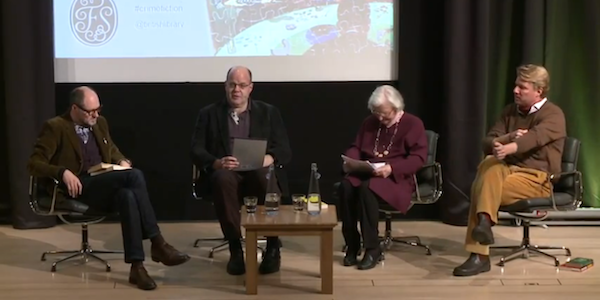Books
The Story of Crime Fiction with P D James, Henry Sutton and Jason Webster
On 8th February 2013 PD James took to the stage at The British Library with Henry Sutton and Jason Webster, to discuss with broadcaster Mark Lawson the history of crime fiction. The night was part of a special programme of events the library are running to coincide with their current exhibition ‘Murder In The Library; An A-Z of Crime Fiction’.
Compere Mark Lawson kicked off the evening by asking the authors to share their favourite crime novels with the audience.
PD James started her selection with The Moonstone by Wilkie Collins – the first detective novel – The Franchise Affair by Josephine Tey; Tragedy of Law by Cyril Hare; The Tudor Mysteries by C J Sampson; and two novels by Dorothy L Sayers, The Nine Tailors and Gaudy Night. She said her choices were all books that she had learnt something important from – from the importance of setting in Dorothy L Sayers, to Josephine Tey’s female heroines who – shock horror – are neither beautiful nor twenty-one!
Jason Webster recommended French crime writer Georges Simenon, who is best known as the creator of fictional detective Jules Maigret. Jason highlighted Simenon’s understanding that beautiful and poetic writing can be just as important as plot in a crime novel. Webster also mentioned Michael Dibdin’s Zen novels. Simenon (a Belgian living in France) and Dibdin (a Brit living in Italy) were both crime writers writing outside their own cultures, just as Jason himself is a British crime writer living in and writing about Spain.
Henry Sutton runs a crime writing course as part of the creative writing school at UEA and he gave us a sneaky insight into their reading list, which makes up his top ten of crime novels. Starting with Raymond Chandler’s Big Sleep and Jim Thompson’s The Killer Inside Me, Henry went on to recommended the following books as must-read crime novels for fans and aspiring crime writers: The Talented Mr Ripley by Patricia Highsmith; The Spy Who Came in from the Cold by John Le Carrè; Roseanna by Sjöwell and Wahlöö; Get Shorty by Elmore Leonard; The Mermaid Singing by Val McDermid; Night Train by Martin Amis; The Affair by Lee Child and The End of the Wasp Season by Denise Mina.
There was also an interesting discussion about the crime genre – from what differentiates a crime novel and a detective novel to why ‘Nordic Noir’ isn’t really ‘noir’ fiction at all, (but the alliteration sounds good).
The panellists also discussed the future of the crime novel. PD James suggested the amateur detective – the staple of Agatha Christie’s Golden of Age of Crime – is now dead because the advances in technology mean that your sleuth needs to be at the very top of his policing game to cut the mustard. Mark Lawson thought that the advent of technology could account for the fashion for ‘cold case’ crime novels and TV series, where old cases can be revisited and solved using new technology.
The night closed with the panel attempting – but failing – to name any happy detectives in crime fiction! Can we help them out and think of any?
The British Library have created a video from the evening and ‘Murder In The Library; An A-Z of Crime Fiction’ exhibition runs until 12 May 2013.


Please note: Moderation is enabled and may delay your comment being posted. There is no need to resubmit your comment. By posting a comment you are agreeing to the website Terms of Use.